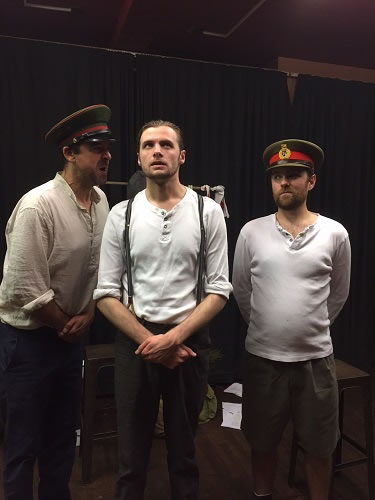An 'excellent production' with 'brave and dynamic' actors says Rory Thomas
| Tweets by @actonw3com |

Last week I visited again the West London Trade Union Club in Acton, and was given to a fresh performance by the Green Curtain Theatre company: Traitors, Cads & Cowards directed by Martin McNamara - as part of a first festival of London Irish Plays.
The evening in question was especially prudent, it being November 11th and Armistice Day - the commemoration to mark an armistice between World War 1 allies and Germany, for the cessation of hostilities on the Western Front.
The show saw again a relatively small cast of three, for three central characters – and the actors doubled-up when necessary for minor periphery roles.
This was a bleak, fast-paced and distressing World War 1 drama, set during 1916 in the aftermath of The Easter Rising (an armed rebellion in Dublin against British rule in Ireland) and portrays a fictional – though not unthinkable - account of three soldiers of both British and Irish allegiance, thrown together on the military wing of Wandsworth Prison, following their arrests for their personal and respective transgressions.
The story plays out almost entirely within one cell which the three men share. A stark and gloomy corner of the prison with little or no furniture, and shared and modest facilities.
Alfred Wood, a deserter of the British Army, cocky, brash and uncompromising, was played by ALRA (Academy of Live Recorded Arts) graduate, Aiden Casey. Henry Boyes, an intellectual conscripted to the war despite his disdain for conflict and being a professed pacifist, was played by musician Benedict Waring. Boyes is sentenced to two years’ hard labour for being what is referred to as a “conscientious objector” – or, refusing to fight on personal moral grounds you might say. And Liam McEnroe, an Irish volunteer and rebel, sentenced to imprisonment for his part in the Easter Rising, was deftly played by last minute appointment, Aonghus Weber. Having spoken with the director I learned that until the day of the performance the part of Liam had been played by another actor, when due to personal circumstances he was drawn away, and Weber took up the role that morning. Weber is an experienced actor working extensively in television and on the stage, and to his credit, and despite on occasion having to refer to his script, he delivered a powerful and impassioned performance, identifying the truth of war, a love for his fallen comrades, and for being an Irishman condemned in an English prison.
Throughout, the three men spend their time together in taught and fractious dialog, taunting one another for their respective misfortunes, justifying their part in the conflict (or for abandoning their post in the case of Alfred), drawing like a blade their personal stories and experiences to the fore, and some idea of the horrors of the Great war. For all his posturing, Alfred Wood is just a boy, in trauma, perhaps suffering PTSD, wracked by the hounds of war that are painfully visible in his shaky manner of smoking, his incessant pacing and his explosive temper. Henry Boyes, the moral conscience of the story, speaks hardly at all, other than to offer counsel, playful lines of philosophy or a doctrine of passivity doled out in the mildest of manners. Liam McEnroe, whom Alfred seeks to harangue, insult and seems to wish to continue between them some micro-version of the war, is a full-hearted and proud Irishman and seasoned fighter, principled and dignified, even in defeat.
The show is a tough and bloody tirade. It’s trenches and shrapnel and fire and waste. A frontline foray into the savagery of war and its many victims, and the plight of those conscripted to battle and the abhorrent truth of the hundreds put before a firing squad should they defect. The stakes could not be higher and each actor strapped on their boots and lances in the execution.
In the beginning these far-flung souls could not be more at odds, especially Alfred and Liam, each man white teeth and wide-eyed with a kind of manic conviction. But in the course of their imprisonment an inevitable bond develops. They begin to trust and share and confide and fail and throughout this dark night of the soul, they embark upon a collective exposition of war, the cost, the sacrifice, the anonymity, the shame and the love. The magnitude of the loss is made all the more devastating when Henry, the meek and gentle one of the three is resentenced and called up once more, forced to fight despite protest, to serve his King and country on the frontline, by the River Somme in northern France. We never see him again and the assumption he is killed in battle. Before he leaves, Alfred, with a new-found respect for Henry, embraces him and breaks down fearing for his life.
This is an excellent production company showing daring and gusto, that houses a brave and dynamic group of actors, writers and directors alike, and I look forward to seeing much more of their work in the future.
Rory Thomas
23rd November 2016